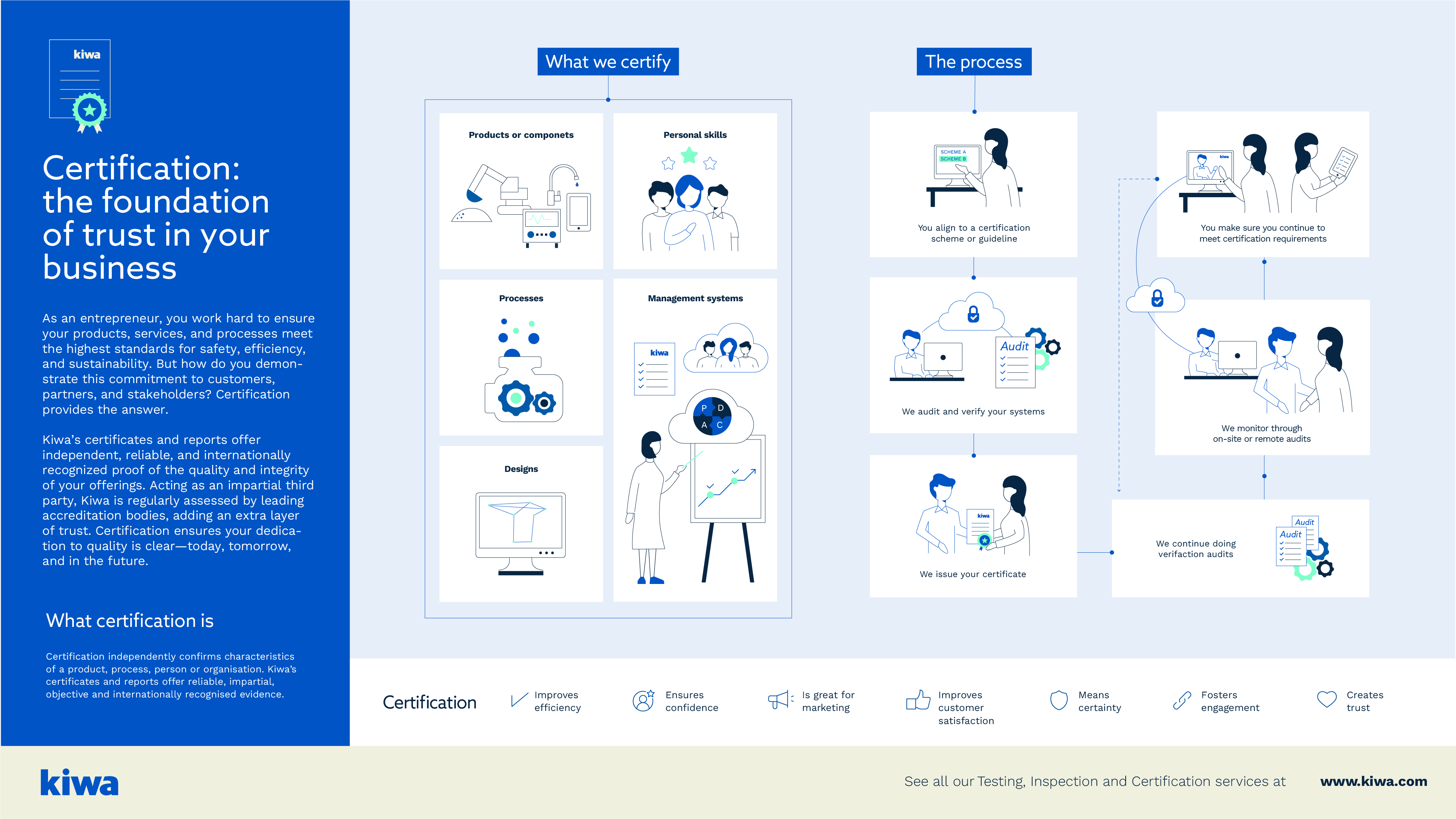Certification
Like every good business, you guarantee the quality you deliver. After all, your products, services, personnel and processes must comply with all the laws and regulations concerning safety, efficiency, control and sustainability. These values all come naturally to you. But convincing potential customers or clients of your good intentions matters, too. Our certification services help you to do this.
More than just certification
Certification can be a useful tool to add credibility, by demonstrating that your product, service, (management) system or employees meet the expectations of your customers. In some cases, certification can even be required by law or contract. Government institutions recognise Kiwa certificates and reports as reliable proof that you comply with European laws and regulations. We can help you make your company's quality values visible to the world and support you in making a positive difference in your (international) market.
Kiwa's services extend beyond simply issuing certificates. At your request, Kiwa - in co-operation with independent experts - can also carry out inspections and research in the fields of risk management, environmental legislation, the working environment and product/service safety. Our combined knowledge of laws and regulations and of technology will ensure you of an impartial and thoroughly grounded evaluation that will exceed both your expectations and the required norm. You can be sure that with Kiwa's input, your organisation will be equipped for the future.
Download the infographic by clicking the image.
The certification process
You have decided that you want your product, process, service, (management) system or personnel to be certified according to a certain certification scheme. Kiwa helps you from start - aligning your company - to finish - handing you your certificate. Here are the steps to take.
Aligning to a guideline
Audit and issuing of certificates
Monitoring certification
Pricing
Kiwa approval
Frequently Asked Questions about Certification
What is certification?
Certification refers to the confirmation of certain characteristics of an object (a product), process, person or organisation. In most cases, this confirmation is provided by some form of external review, assessment, or audit. So, an accredited or authorised person or agency assesses and verifies (and attests in writing by issuing a certificate) the attributes, characteristics, quality, qualification, or status of something or someone. The assessment and verification are in accordance with established requirements or standards.
Why should I certify?
A certificate creates trust. Trust in your products, services, (management) processes and employees. Your certificate enables you to demonstrate that your organisation works efficiently and safely, that you manage the work and work processes and that you strive to be sustainable. It allows you to reduce risks, improve the quality of your organisation and have more satisfied clients. An independent third party like Kiwa ensures it stays that way.
Apart from creating trust, here are additional reasons for certification.
What can Kiwa certify for me?
Kiwa is a global authority in a wide variety of markets, from construction and energy to water and healthcare. Our experts know their way around the minefield of European and global regulations, quality norms and safety criteria. This knowledge enables them to open doors for you that would have otherwise remained closed. We may make the difference in your efforts to access markets. And we can certify quite a lot, as you will see below.
What is first, second and third-party certification?
First-party certification means that the individual or organisation providing a product or service offers assurance that it meets certain claims. CE marking is an example of first-party certification. A CE mark is often needed to bring a product to the European market. By marking a product, a producer assures it has been tested and meets basic criteria regarding safety, health and the environment.
In second-party certification, an association to which the individual or organisation belongs provides the assurance. An association can, for example, create a quality mark for a certain market segment. Individuals or organisations can obtain it by meeting the requirements set. Thus, such a mark may improve quality level.
Kiwa provides third-party certification. This kind of certification involves a fully independent assessment declaring that specified requirements pertaining to a product, person, process or management system have been met. The requirements have been independently drawn up by Boards of Experts representing a certain market segment or an association. The advantage of third-party certification is that you nor your association, but an independent third party assures you and your customers that objective requirements have been met.
What is accreditation?
On top of certification, there is accreditation. Organisations like Kiwa that certify third parties are themselves formally accredited. Accreditation is provided by a so-called accreditation body, which is put in place by the government of a certain country. The accreditation process ensures that certification practices are acceptable, which means a certifier is competent to test and certify third parties, behaves ethically and employs suitable quality assurance. Kiwa has been accredited by various accreditation bodies for a wide variety of certification processes in many countries.
What is a Notified Body?
Kiwa is also a Notified Body, or NoBo. In the European Union, a NoBo is a third-party entity that has been accredited by a Member State to assess whether a product to be placed on the market meets certain standards. Conformity assessment can include inspection and examination of a product, its design, and the manufacturing environment and processes associated with it.





